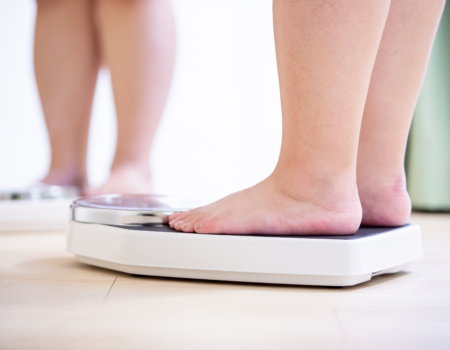How to Move Beyond Your Weight Loss Plateau

You’ve made the choice to start a program and a journey towards a healthier lifestyle, but on your way, you see your progress slow down. Slower weeks will happen during your program, but that doesn’t mean you won’t be successful!
Make sure you follow the recommended number of Cōpare products each day, as well as consuming 4 cups of vegetables, your recommended dinner protein portion, and 2-4 tablespoons of extra virgin olive oil (EVOO). When you start skipping Cōpare meals/snacks, vegetables, or your healthy fat (ex: EVOO), you run the risk of reducing your calories too much thus slowing down your fat burn.
Do You Track What You Eat?
In a two-week study, 10 overweight people reported consuming 1,000 calories per day. Lab testing showed they were actually taking in about 2,000 calories per day. Many people tend to underestimate the amount of food they eat. For example, not measuring your extra virgin olive oil or not weighing your protein, can lead to consuming too many calories, hindering the progress of your weight loss.
Keep track of everything, even the creamer you put in your coffee or the dressing you use on your salad. As you progress through the program, stay consistent with measuring and weighing so that you stay on track. If you are experiencing issues with hunger, speak with your coach and work out a plan before making adjustments on your own.
What about Exercise/Physical Activity?
Weight loss is not just about eating less and exercising more. Be mindful of signs of over training. If you notice yourself gaining weight, feeling fatigued, having aching muscles, or experiencing a loss of appetite, you may be over training. While exercise is a wonderful thing for your body, too much, especially while in a calorie deficit, can slow your weight loss progress.
While on the Cōpare program, we recommend at least a 30-minute daily walk. If you want to incorporate more exercise, keep it to moderate intensity and under an hour in duration. Always keep your coach up to date as adjustments may need to be made to your program if you plan to exercise at a higher intensity.
How’s Your Stress?
Chronically elevated stress levels have a negative effect on the human body and often results in fatigue, a depressed emotional state, a compromised immune system, and even weight gain. Stress can trigger one to eat more and can raise cortisol levels, your body’s main stress hormone. High levels of cortisol are associated with increased abdominal fat.
Don’t let stress get the best of you. Take measures to help reduce some of the stress you may be feeling. Focus on activities that don’t involve food. For example, consider downloading a meditation app, such as Calm, practicing yoga, calling a friend, listening to podcasts, going on a walk, exercising, or partaking in some self-care (massage, face mask, or even a bubble bath). Reducing stress is different for everyone, so try out a variety of things to see what works best for you and your schedule.
Sleeping Enough?
Being short on sleep can affect your weight loss. A third of Americans are not getting enough sleep on a regular basis but it’s just as important for your weight loss as diet and exercise. Your hormones will begin to fluctuate if you’re not getting enough sleep. Cortisol is naturally higher in the morning and during the day, then low by the end of the day. Lack of sleep causes you to be more sensitive to stress, therefore your levels of cortisol tend to stay higher even at night, perpetuating a lack of sleep. Cortisol is not the only hormone affected. Ghrelin and leptin, two hormones associated with appetite, are also affected. Leptin, an appetite suppressor, is decreased and ghrelin, the hormone responsible for hunger, is increased. This results in more cravings, such as sugars.
Some ways to improve your sleep include:
- Reduce blue light exposure. Try the “night shift” or “warmer” option on your electronics or substitute electronics for a good book.
- Set a goal to be consistent about wake and sleep times. Irregular sleep patterns can alter your circadian rhythm and levels of melatonin.
- Consider an herbal tea. Chamomile and lavender teas have been shown to help calm your body and mind in the evening.
Are You Consistent Day to Day, Week to Week?
Consistency is one of the most powerful tools you have; your brain actually craves it. Consistency allows you to develop a routine and create healthy habits that last beyond your time on the Cōpare program. When you start to skip snacks or vegetables, add in off program foods, or even over serve yourself, you can confuse your body and cause swings in your weight.
Change your mindset. Don’t focus on “dieting,” rather focus on changing your lifestyle. Set small, attainable goals each week such as drinking more water or going on daily walks. Achieving small goals is rewarding and will reinforce good healthy habits that last. Dig deep, find a meaningful reason (or two or three) to motivate yourself and stay on track.
Weight Loss Takes Times
Don’t get consumed by misleading advertisements about quick weight loss. Healthy, sustainable weight loss takes time; there is no quick fix.
We also tend to be linear thinkers, but weight loss is not linear. The number of pounds you lose will vary from week to week. Weight loss won’t always happen exactly every 7 days. Some people will experience weight loss weekly or every 10-14 days and that’s still progress. Be patient, stick with the plan and your hard work will pay off!



